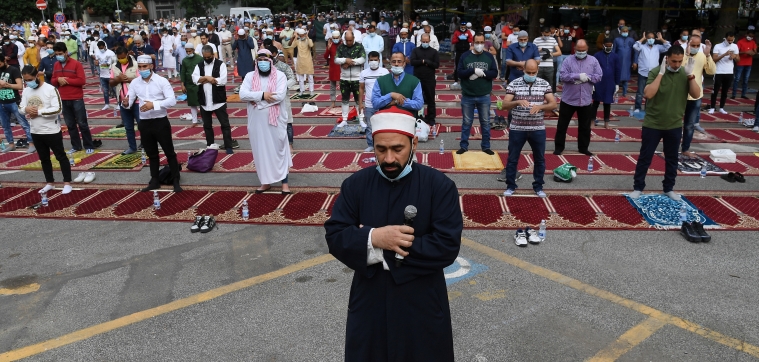In an entrance hall to Azzano San Paolo, Bergamo’s only Islamic cemetery, hang the names of 43 Muslim community members who died during this northern Italian city’s disastrous and dispiriting experience with the COVID-19 pandemic. Among those remembered are Jawad El Mehdi’s grandparents, Ahmad and Malika Jawad.
“They were the pillars of the Jawads,” said El Mehdi, a 21-year-old Italian who was born and raised in Bergamo. His grandparents emigrated from Casablanca, Morocco, in 1990.
“They are among the more than 16,800 people in Lombardy who died of complications related to COVID-19 since February.
While Jawad’s family was unable to provide his grandparents with a traditional Islamic funeral due to Italy’s lockdown measures, they had the rare luxury, for Italian Muslims, to be buried in an Islamic cemetery.
Before the pandemic struck, fewer than 60 of Italy’s 7,903 municipalities had a dedicated Islamic cemetery, in a country that is home to more than 2 million Muslims.
The limited number of burial spots has to do with the peculiar relationship between Italy’s Muslim community and Italy’s local officials.
According to a 2019 U.S. State Department report on religious freedom, there were “only five mosques that Italy’s regional governments and Muslim religious authorities both recognized.”
The faith’s other 1,200 religious centers nationwide are registered simply as nongovernmental organizations.
Despite a push to fill that legal void in 2017, “Muslims continued to experience difficulties in acquiring permission from local governments to construct mosques or to continue operating existing ones,” the report said.
Before the COVID-19 emergency, Italy’s Muslims didn’t regard the cemetery shortage as a priority. The living were more concerned with where to pray, with some resorting to so-called garage mosques.
With few places to pray, there were even fewer places to bury the dead. According to Islamic tradition, cremation and interment above ground are forbidden.
A body must be buried after a purifying bath, usually within 24 hours of death and with the head of the deceased facing toward Mecca.
The pandemic brought the issue of burial space to the forefront. Since Italy stopped allowing bodies to be sent out of the country on March 1, many had to be buried on Italian soil, and the stricture to hold the burial within 24 hours could not always be honored.
In one case, a Macedonian family in the province of Brescia had to keep the body of one of its members enclosed in a coffin at home for a week because the city in which the family lived lacked an Islamic burial ground, according to the Union of Islamic Communities and Organizations in Italy, or UCOII. (Religion News Service).

 Join Daily Trust WhatsApp Community For Quick Access To News and Happenings Around You.
Join Daily Trust WhatsApp Community For Quick Access To News and Happenings Around You.
